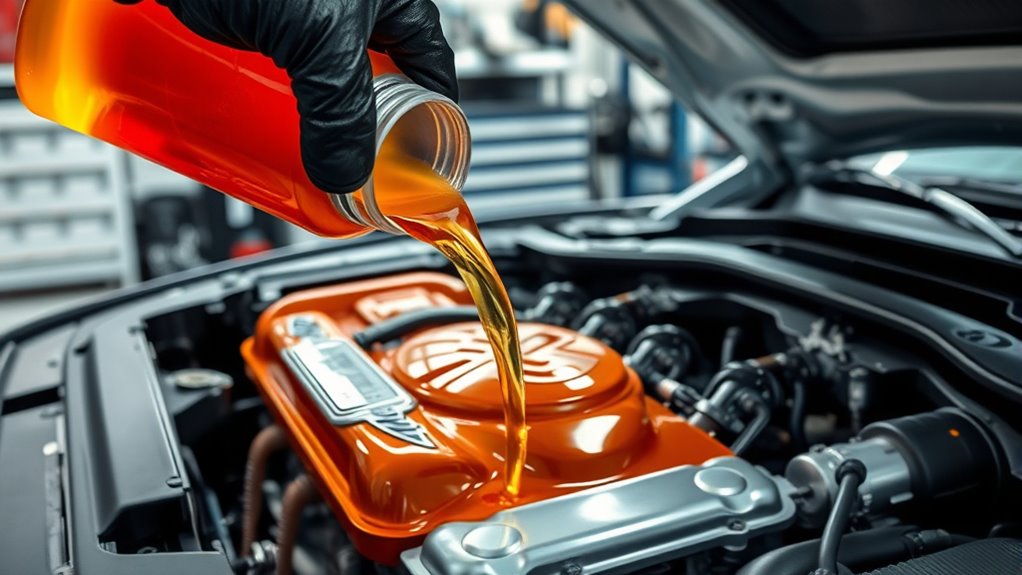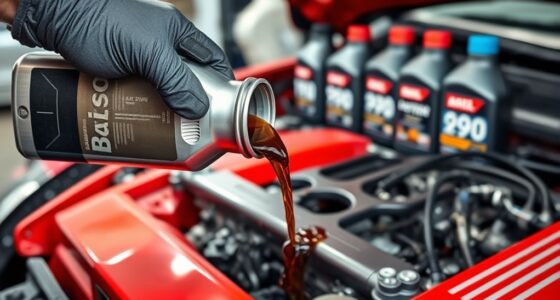Engine flushes help you remove sludge, deposits, and contaminants that can clog engine parts and reduce performance. Use them when your engine runs roughly, makes unusual noises, or shows signs of oil contamination. They’re especially helpful if your vehicle has high mileage or recent repairs, but aren’t necessary for newer engines. Properly performed flushes can improve oil flow, cooling, and longevity. To discover the best timing and precautions, you’ll want to explore more details ahead.
Key Takeaways
- Engine flushes remove sludge, deposits, and contaminants to improve engine cleanliness and performance.
- They are recommended for engines with high mileage, irregular oil changes, or recent repairs disturbing internal parts.
- Flushing helps prevent long-term damage by enhancing oil circulation, lubrication, and cooling.
- Not necessary for all engines; newer models may not require flushing and could be harmed by it.
- Proper use involves qualified technicians, reputable products, and post-flush oil and filter changes for optimal results.

Engine flushes can be a helpful maintenance step when your engine shows signs of sludge buildup or oil contamination. Over time, engine oil can become contaminated with dirt, debris, and combustion byproducts, which can lead to sludge formation. This sludge can clog oil passages, reducing lubrication efficiency and increasing wear on engine components. When you notice your engine running rough, unusual noises, or a drop in performance, it might be time to consider an engine flush to promote proper sludge removal and restore peak function.
During an engine flush, a special cleaning solution is introduced into your engine before the oil change. This solution circulates through the engine, breaking down accumulated sludge and dissolving contaminants that have adhered to internal surfaces. The goal is to loosen deposits that regular oil changes might not fully eliminate, ensuring cleaner oil circulates through the system. Proper sludge removal is vital because sludge can restrict oil flow, which hampers cooling and lubrication, eventually leading to engine overheating or damage. An effective flush can help dislodge these stubborn deposits and prevent long-term issues. Additionally, using a high-quality engine oil and filter after the flush can help maintain engine cleanliness and performance.
Engine flushes help remove sludge and contaminants, protecting engine health and performance.
You should consider an engine flush if your vehicle has high mileage, especially if it hasn’t had regular oil changes or if it’s been running with old, dirty oil for an extended period. It’s also advisable if you’re experiencing sluggish engine response, increased emissions, or if you’ve recently had engine repairs that disturbed internal components. Keep in mind that not all engines require flushing; newer engines with high-quality oil and regular maintenance may not benefit from this process, and in some cases, it could do more harm than good.
While engine flushes can be beneficial, they’re not a substitute for consistent, quality oil changes and proper maintenance. If you decide to proceed, make sure it’s done using a reputable product and by a qualified technician. After the flush, you’ll want to replace the oil filter and fill your engine with fresh, high-quality oil to guarantee the cleaning process is effective and that your engine remains protected. Regular maintenance, including oil change intervals, is essential to prevent sludge buildup and ensure long engine life.
Frequently Asked Questions
Can Engine Flushes Improve Fuel Efficiency?
Engine flushes can improve your fuel economy by cleaning out sludge and deposits that hinder engine performance. When your engine runs smoother and more efficiently, it uses less fuel, saving you money at the pump. Regular flushes help maintain ideal engine performance, preventing issues that decrease fuel efficiency. Keep your engine clean and well-maintained to enjoy better fuel economy and guarantee your vehicle runs at its best.
Are Engine Flushes Safe for High-Mileage Vehicles?
Are engine flushes safe for high-mileage vehicles? If you’re concerned about engine longevity, using synthetic oils can help protect your engine’s parts. Generally, engine flushes are safe for high-mileage vehicles if done correctly and with proper products. However, it’s wise to consult your vehicle’s manufacturer or a trusted mechanic. They can assess whether a flush might cause any issues, especially if your engine has existing problems.
How Often Should I Perform an Engine Flush?
You should perform an engine flush every 30,000 miles or during your regular oil change, especially if your vehicle has high mileage or shows signs of sludge buildup. An engine flush helps with engine cleaning, removing dirt, sludge, and old oil residues that can affect performance. Just make certain you follow your manufacturer’s recommendations and consult a mechanic if you’re unsure, to keep your engine running smoothly.
Do Engine Flushes Remove Beneficial Oil Additives?
Did you know that over 80% of engine wear comes from deposit buildup? Engine flushes can remove harmful sludge but may also wash away beneficial oil additives that protect your engine. If your oil contains quality additives, a flush might diminish their effectiveness temporarily. However, regular cleaning helps maintain engine performance. Just be cautious and follow manufacturer recommendations to ensure you don’t lose essential oil additives during the process.
Can Engine Flushes Fix Existing Engine Damage?
Engine flushes can’t fix existing engine damage. They help remove engine sludge and oil residue, which can improve performance and extend engine life. However, if your engine already has significant wear or damage, flushing won’t repair those issues. Instead, it’s best to consult a mechanic to assess the damage and consider repairs. Flushing is a preventive step, not a cure for existing engine problems.
Conclusion
Knowing when to use engine flushes can help keep your engine running smoothly and extend its lifespan. If your vehicle has high mileage or shows signs of sludge buildup, an engine flush could be beneficial. Remarkably, studies show that regular maintenance like flushes can improve engine efficiency by up to 15%. By staying proactive and understanding when flushes are needed, you can ensure your engine remains reliable and performs at its best for years to come.









